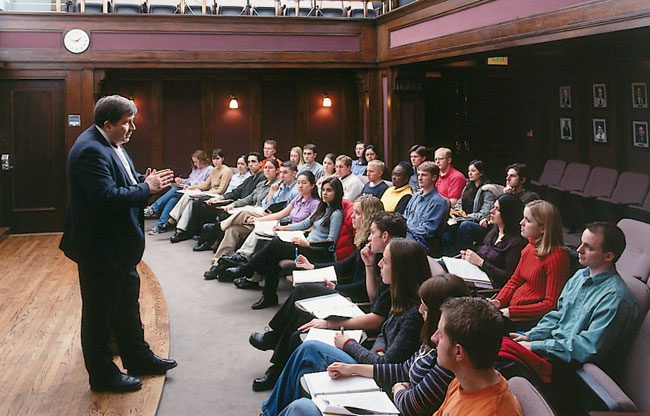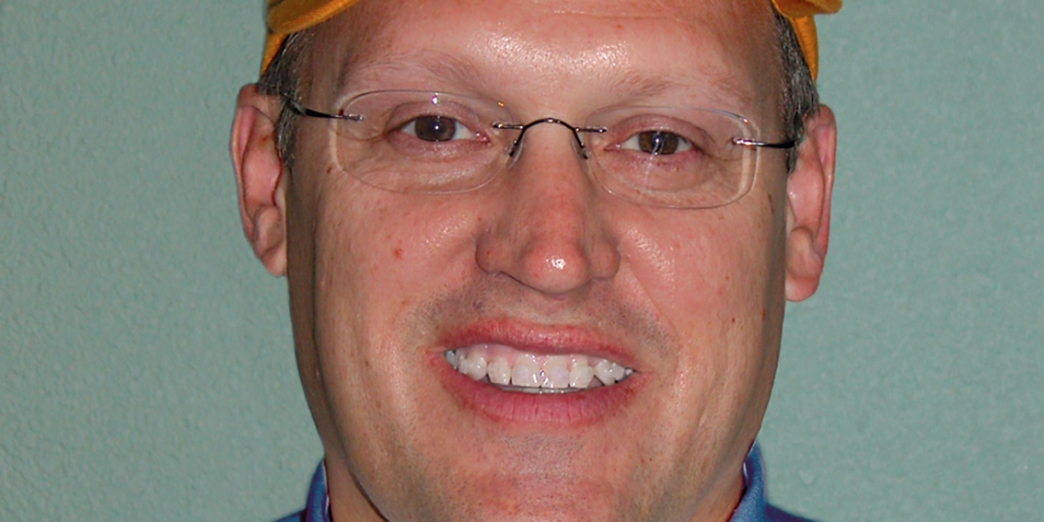By Richard Davis
The first day of each semester, I show my American government class a video clip from the 1939 film classic, Mr. Smith Goes to Washington. In the segment, newly appointed U.S. Senator Jefferson Smith, played eloquently by Jimmy Stewart, takes a self-guided tour of the tourist attractions in Washington, D.C. Passing the Washington Monument, the Jefferson Memorial, and other famous historical sites, Smith eventually ends up at the Lincoln Memorial and observes a young boy and an older man reading the Gettysburg Address together. The scene almost always gives me goose bumps.
I then ask my students what they think of it. Usually the responses are similar to my own. But lately they have been different. Students are quick to point out that the sentiments expressed in that scene have nothing to do with reality. There is a sharp edge of cynicism in their voices.
Such cynicism may seem understandable. Reports of sleaze and corruption have come to dominate the public agenda. A president is accused of perjury and obstruction of justice. The House of Representatives impeaches him, and although the Senate votes to acquit, the president carries a historical mark as only the second president to be impeached.
The president is not the only one touched by scandal. Cabinet members are investigated. Members of Congress are accused of immorality, and their personal lives are discussed as openly as public policy. Presidential candidates admit to past indiscretions to avoid media discovery. The picture of politics purveyed by the press is not a pretty one.
The revulsion many people may feel toward all of these events could have long-term implications for a willingness to become involved in politics. Attitudes of cynicism may deepen.
Voter turnout may drop even further. Community involvement may seem futile. Even more disquieting, a cloud of gloom may settle over the minds of citizens as frustration breeds cynicism, which in turn engenders general apathy.
As responsible citizens, however, we cannot afford to turn our backs on the political process, no matter how disgusted we may be. Citizen involvement is imperative for successful communities to exist. The LDS Church First Presidency has repeatedly urged members to use the right of franchise to become involved in changing their communities for the better. Such involvement often means attempting to directly shape the political process.
What should we do to avoid joining the movement toward apathy? I would suggest three actions: educate, participate, cooperate.
Educate
Recently one public official confided to me that he was tired of sitting through public hearings where people speak emotionally but lack information that could actually influence the public policy process. Too often we become upset about some government action without educating ourselves about either the policy or the process which led to the action.
In order to be effective citizens, we need to be continually informed about the problems of the day. We should remain informed by reading a daily newspaper, watching a television news program, or regularly following some reliable news source.
To make a difference, sometimes it becomes necessary to do more research to become an expert on an issue. The Internet now offers much of this at our fingertips—texts of bills, scheduling of bills, various government reports, etc.
For example, recently I petitioned my school board to reduce class sizes in the local junior high schools. With the help of the Internet, I found studies on the effects of class size on students’ academic performance. Through some telephone calls, I gathered information about current class sizes from the school district administration. Then I compared the performance of other schools in other areas, and I estimated how much class-size reduction would cost. Finally, I sent my information to the board and urged them to take action. Such an effort was not a major investment of time, but it was enough to convince the school board to listen, seriously consider my request, and ultimately take action to address the problem.
Not only must we educate ourselves about policy, but it is imperative that we also understand the governmental process. When people are uninformed, they often take the problem to the wrong authorities at the wrong time. Then they become frustrated at their ineffectiveness.
Often I have watched as citizens learn about a governmental decision at the last minute, or even after the decision is made, and become upset about the decision. Yet, when public hearings were held and decisions were being made, the public was nowhere to be found. The best time to lobby concerning a proposed change of policy is before or during a session of a legislative body, such as a city council or state legislature, and not after the session is over.
Participate
Once you have educated yourself on the policy and the process for making that policy, then it becomes necessary to act. Write the letter, make the phone call, send the fax, or type the e-mail that expresses your view about the issue. Take the time to attend the relevant sessions of the governmental body making the decision, be it the city council, the school board, or the state legislature.
Organize others to join forces with you. Others will stand with you once they recognize that someone is willing to take the lead. Policy makers respond to groups of citizens. What they do not appreciate is a mob making demands and hurling insults. Make sure the citizens you mobilize keep calm and understand that public officials, like anyone, prefer to be treated civilly and respectfully.
Sometimes people are quickly discouraged because they have a somewhat Pollyannaish view of the political process. They believe that because they participate, their request ought to be granted merely because they offer it. They become frustrated when, after doing their homework, sending letters, mobilizing supporters, and meeting with public officials, they still lose. Then, frustrated at the loss, they vow never to participate again.
It is important to keep in mind that even if you lose, the very act of participation has been healthy, both for the political system and for you: Another perspective has been provided to policymakers—one which actually may prevail in the long run—and those citizens who have become involved have gained valuable experience in how the process works.
Another common feature of participation is “nimbyism” or the philosophy that the problem should not be solved “in my backyard.” People often get involved in the political process because some decision directly affects them—a road expansion, a new school, new commercial development in their area, etc. Such involvement does offer public officials insight on what people think about a policy change, but it may miss the big picture. The immediate localized benefit of some policy change may be deleterious for the whole. Conversely, some sacrifice by a few may be essential to benefit the larger community.
For example, on one occasion I saw parents from one school lobby against building a new school to address new development in another subdivision because their own school’s boundaries would be changed by the addition of a new school. Those parents saw the narrow picture—some change in their school boundaries was occurring that would affect their children—rather than the big picture: Rapid growth in the city necessitated the building of new schools. Wisely, the school board sought to effect a compromise that minimized the upheaval to residents of the complaining neighborhood while still meeting community needs.
Cooperate
Politics exist precisely because we all have different opinions on how government ought to be. As a result, the optimal final product of the policy process is a compromise that usually pleases no one completely, but leaves all at least minimally satisfied. Only if all views were exactly similar could this be avoided. But what a dull world that would be!
Obviously there are other ways to resolve conflicts. One option is for the majority to receive complete satisfaction while the minority is left with nothing. Although that solution makes a majority happy, it could leave a minority very unhappy. Since we never know when we may be in the minority, that kind of resolution is unsatisfactory. We could also dismantle the political process and fail to reach any solution. But that, too, would be undesirable because the problems society needs to address will not automatically go away. Hence, compromise is the best alternative since it offers something for nearly everyone.
But the key to achieving compromise is cooperation. Cooperation means seeing the value of others’ views, even when those views are quite different from your own. Cooperation means reaching out to others in order to find common ground.
Seeking the Interest of His Neighbor
Members of the LDS Church are told that they should be “anxiously engaged in a good cause, and do many things of their own free will” (D&C 58:27). Church members can do this, the Lord says, because “the power is in them” (D&C 58:28). Cynicism drains us of that power since it saps our will to “bring to pass much righteousness.”
We should “never be weary of good works” (Alma 37:34) but instead contribute to the making of our communities into a society where “every man [is] seeking the interest of his neighbor” (D&C 82:19). If we educate ourselves about the problems around us, participate as community and political activists, and cooperate to achieve solutions, we can break the cycle of cynicism and ultimately help bring to pass the kind of society in which we would all like to live. ![]()
Richard Davis is a BYU professor of political science.









